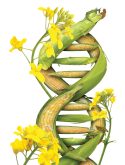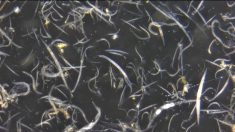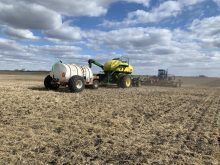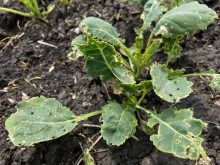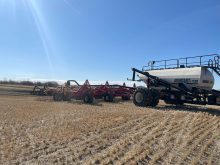Saskatoon-based MustGrow Biologics Corp. is working on a product derived from mustard seed it says will potentially control clubroot, a yield-robbing canola disease currently without chemical control.
It has infected thousands of acres in Alberta and is spreading in Saskatchewan and Manitoba.

“In the lab we are seeing 100 per cent control (of clubroot spores),” MustGrow’s chief operating officer Colin Bletsky said in an interview June 3.
The next step is greenhouse testing and then field trials, which might start this fall, he said.
The product is already registered in Canada and the United States in a granular form and registration of a liquid version, which will make it more affordable in canola crops, is already underway, Bletsky said.
Since it’s not toxic, he’s hoping the new formulation could be approved perhaps as early as next year.
“We need to test more to make sure it’s viable (on clubroot in the field),” Bletsky said. “I want to make sure I am not promising too much. We’ve seen great results to date, but we’ve got to do more.
Read Also

CUSMA access key among other trade noise: Seeds Canada panel
Seeds Canada conference panelists say Canada needs to stay focused and wait as U.S. trade and tariff chaos develops, and a Canada-U.S.-Mexico Agreement review looms
“We are very excited.”
The Canola Council of Canada hopes MustGrow succeeds, Curtis Rempel, its vice-president of crop production and innovation, said in an interview June 4.
MustGrow’s premise is based in scientific, but only more research will determine if it works on a field scale, he added.
“Our enthusiasm for innovation should not be misconstrued as an endorsement for something that has no field testing whatsoever (yet),” Rempel said.
Why it matters: Clubroot has no chemical controls. An affordable control for the canola yield-robbing disease would be a game changer.
The fact that MustGrow’s product is a natural, plant-based, organic certified, non-toxic pre-plant biopesticide seems, at first blush, too good to be true. But according to Bletsky the active ingredient has proven successful in controlling several diseases including fusarium, pythium and rhizoctonia, in a number of high-value vegetable and fruit crops.
In addition, the product controls certain nematodes and even small weed seeds, according to Bletsky.
“Our granular (version) worked well,” he said. “When it came to efficacy and consistency we were competing with the chemical products.”
But the granular formulation is expensive, especially for field crops such as canola, Bletsky said.
The early research related to this product was done by Agriculture and Agri-Food Canada and an earlier iteration of MustGrow purchased the rights to it, Bletsky said.
The active ingredient comes from two components found in mustard seed — a glucosinolate called sinigrin and an enzyme called myrosinase, he said.
When mixed with water they form allyl Isothiocyanate (AITC).
“The AITC is a cell disruptor,” Bletsky said. “So it will go in and disrupt the cell walls and essentially that pest just dies.”
And because it’s a natural, pests are unlikely to develop resistance to it, he added.
MustGrow has spent $10 million over 10 years researching AITC’s effectiveness, Bletsky said.
“The key is this molecule works, but it has never been able to work in an economic fashion or at a low enough use rate to be applied in things like canola,” he said.
The science is well documented, and the historic record shows farmers benefited by planting mustard and other brassicas as cover crops, Bletsky said.
“It passes the plausibility test,” Rempel said. “Mustard has allyl Isothiocyanates and all types of other bioacids so this isn’t something that’s not in the realm of scientific plausibility either. There’s definitely something there.”
But there are many questions to be answered, Rempel added, such as application rates and how well it will work in cold soils and short growing season.
It may turn out this biopesticide is better suited for high-value horticulture crops where conditions are closer to those in the laboratory.
But if it proves successful in controlling clubroot, it will be of great benefit, he added.
It could be an important tool even if just as a spot treatment or for cleaning equipment to prevent spreading the soil-borne disease.
“It could be one more potential tool in the tool box, and that tool box isn’t overly full right now for clubroot, that’s for sure,” Rempel said.
If the product works it will still be important for farmers to use an integrated pest management approach, including crop rotation and planting clubroot-resistant varieties, Bletsky said.
The council has provided MustGrow with the names of third-party researchers that can help the company test its product, Rempel said.
“We’re glad they have some evidence from the (lab) bench, and we’re happy that they are looking at collaborating with the experts in Canada,” he said. “That will serve them well.”
While it’s too soon to know if the product will be commercialized, it’s worth considering, he said. It’s easy to be skeptical, but “out-of-the-box thinking” is needed sometimes to bring about innovation, Rempel added.
“If the product is efficacious and affordable there will be a fit for it.”
If the product works on a field scale and is registered, it will require lots of mustard seed, Bletsky said.
“We are trying to provide another value-added (opportunity) for that mustard grower,” he said. “It’s a Saskatchewan crop and if we can provide a Saskatchewan-based solution to a major western Canadian problem I’d love to see it because I have some friends having issues with clubroot and we’d be very proud to be able to execute and bring that to market.”








